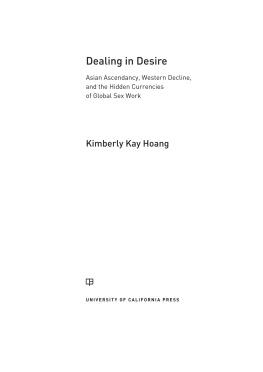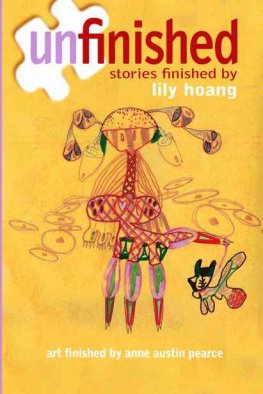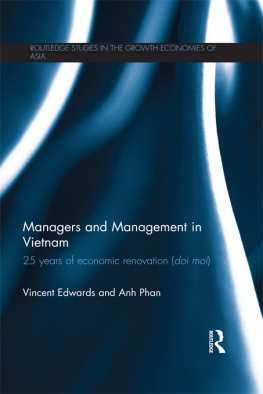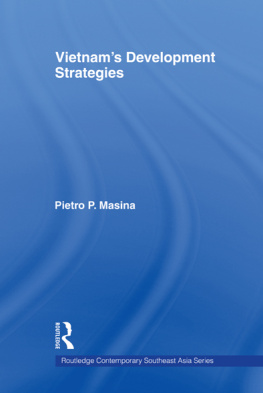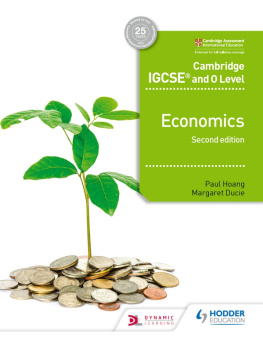Dealing in Desire
Eye-opening and groundbreaking. Kimberly Kay Hoangs tour-de-force ethnography inhabits and crosses multiple domains of desire-making to showcase the mutual construction of masculinities, financial dealmaking, and transnational political-economic identities. Through the innovative frame of desire as a force of production, this work dismantles the problematic analytic binaries of culture and economy. Specifically, by viscerally analyzing the role of confidence, the production of hierarchical status, and the buttressing of failureall premised on particular performances of feminine submissionin creating the conditions of possibility for investment (and individual) potentials, Hoang delivers what many works have only promised: an example of how embodiment, inequality, and intimacy construct social economies. Differential masculinities and womens roles in brokering these differences while making space for their own life projects are the currencies of market development and action. Rarely ever has the relationship between desire, work, capital, and national identity been so clearly articulated. Truly an intrepid, captivating ethnography.
Karen Ho, author of Liquidated: An Ethnography of Wall Street
Dealing in Desire is obviously an exceptionally courageous book given the challenging fieldwork that Hoang engaged in. But equally importantly, it is a very astute book that connects different modes of presentation of the body by Vietnamese karaoke girls to specific organizational contexts and to macro structural transformations in East Asia. The book stands out as a signal contribution to the new sociology of transnationalism.
Michele Lamont, Director, Weatherhead Center for International Affairs, Harvard University, and author of The Dignity of Working Men
Boldly linking global political and economic transformations to intimate transactions, Hoangs Dealing in Desire offers a transformative account and novel analysis of sex work. A welcome contribution to gender studies and the economy of intimacy, this book will interest a wide audience.
Viviana A. Zelizer, Lloyd Cotsen 50 Professor of Sociology at Princeton University, and author of The Purchase of Intimacy and Economic Lives
The most extraordinary ethnography I have read in years. At a time when ethnographers in sociology seem inclined to write sensationalist accounts designed for mass appeal, Hoang represents the relationship between sexual and economic relations in Vietnam with exceptional thoughtfulness, methodological self-reflection, and theoretical sophistication. The book beautifully examines the relationships among masculinity, femininity, power, sexuality, and financial transactions among Vietnamese women and Western and Vietnamese men, making clear the many ways that sex workers and their clients or patrons manipulate their relations to meet complex personal and economic needs. Hoangs approach is masterful. She respects her subjects enough to avoid feeding two of the most common tropes in common representations of Asian sex workers, the exotic doll and the helpless victim. And she respects her readers enough to challenge us with a complex yet consistently engaging narrative. Dealing in Desire is a triumph.
Mario Luis Small, Grafstein Family Professor, Harvard University, and author of Unanticipated Gains: Origins of Network Inequality in Everyday Life
In Dealing in Desire, Hoang shows us how to look at the micro to learn about the macro. Her rich ethnographic account of the sexual industries in Vietnam situates our understanding of sex work in a larger political economy as it illustrates how race, nation, and class produce multiple masculinities and femininities.
Rhacel Salazar Parreas, author of Servants of Globalization: Women, Migration, and Domestic Work
Dealing in Desire is easily the most deeply researched and rigorously argued book ever written about the Vietnamese sex industry, and it is surely one of the most authoritative studies currently available on the sociological dynamics of sex work in the current era of accelerated globalization. For a piece of serious academic scholarship, it is also a remarkably gripping read.
Peter Zinoman, Professor of History and Southeast Asian Studies, University of California, Berkeley
Dealing in Desire
Asian Ascendancy, Western Decline, and the Hidden Currencies of Global Sex Work
Kimberly Kay Hoang

UNIVERSITY OF CALIFORNIA PRESS
University of California Press, one of the most distinguished university presses in the United States, enriches lives around the world by advancing scholarship in the humanities, social sciences, and natural sciences. Its activities are supported by the UC Press Foundation and by philanthropic contributions from individuals and institutions. For more information, visit www.ucpress.edu.
University of California Press
Oakland, California
2015 by Kimberly Kay Hoang
Library of Congress Cataloging-in-Publication Data
Hoang, Kimberly Kay, author.
Dealing in desire : Asian ascendancy, Western decline, and the hidden currencies of global sex work / Kimberly Kay Hoang.
p. cm.
Includes bibliographical references and index.
ISBN 978-0-520-27555-3 (cloth)
ISBN 978-0-520-27557-7 (pbk. : alk. paper)
ISBN 978-0-520-96068-8 (ebook)
1. Sex-oriented businessesVietnam. I. Title.
HQ242.5.A5H635 2015
338.47306709597dc232014032692
Manufactured in the United States of America
24 23 22 21 20 19 18 17 16 15
10 9 8 7 6 5 4 3 2 1
In keeping with a commitment to support environmentally responsible and sustainable printing practices, UC Press has printed this book on Natures Natural, a fiber that contains 30% post-consumer waste and meets the minimum requirements of ANSI/NISO Z 39.481992 ( R 1997) ( Permanence of Paper ).
Cover art by Dinh Thien Tran.
In loving memory of Lois Mumm
For Richard (Men), Nancy (Ha), Jamie (Che), Andrew (Quoc-Viet), and Lillyan (Thuy-Tien) Hoang for the material sacrifices you made in your lives that enabled me to find the creative space to write
Contents
Acknowledgments
This book has taken me on an incredible journey filled with high highs, low lows, some tears, and a lot of laughter. When I embarked on this journey, I never imagined how many people it would take to guide and inspire me through the myriad twists and turns of this project, from the initial proposals to fieldwork and theorizing to writing and rewriting. Although I bear responsibility for whatever faults you may find with this book, I owe my work to so many people who generously provided me with their assistance along the way.
My greatest debt is to the men and women who let me into the most private and intimate spaces of their lives and who taught me how to manage a broad range of relationships in the field. The social debt that I owe these individuals is enormous. There are many whom I cannot name here without unnecessarily complicating their lives, but I would like to thank a few people using their chosen pseudonyms. First and foremost, I am deeply indebted to CQ, TTV, TinTin, Nguyen Nguyen, and Anh Cua Ti, who risked their reputations, businesses, and social connections to help me gain access to the most elite bar in Ho Chi Minh City, which catered to some of the most powerful local elites. These informants taught me how to manage a range of relationships with bar owners, local officials, the police, clients, mommies, and women working in the bars. To high-level officials, elite businessmen, and various others, they introduced me as a trusted researcher. Without their support, collecting this research would not have been possible. I also thank Anh Nguyen, Lilly, and Tina, all of whom welcomed me into their bars, teaching me the ropes and allowing me to make several mistakes at their expense. I am enormously grateful to the women who adopted me into their bars, sharing their clothing, makeup tips, and other insights into managing clients. All the individuals described in my book had a huge impact on my life, forever transforming the way I see the world.

